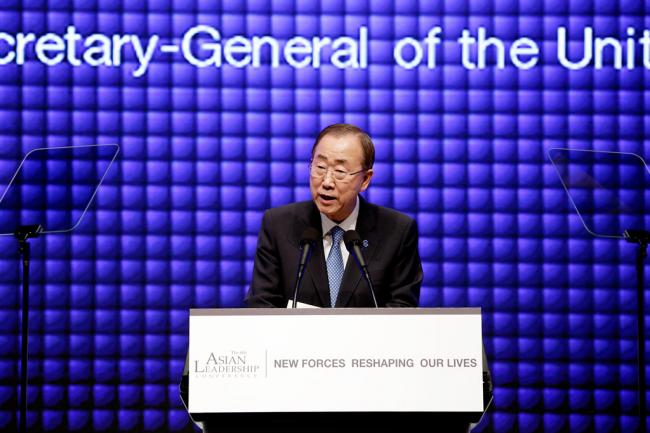“My visit is also significant as the first by the United Nations Secretary-General to set foot on the DPRK in more than 20 years since the last visit by the former Secretary-General Boutros Boutros-Ghali,” Ban told a press conference in Inchon, Republic of Korea, where he later addressed the World Education Forum.
“The Kaesong project is a win-win model for both Koreas,” he said referring to the industrial complex just north of the heavily fortified border between Republic of Korea (ROK) and the DPRK.
He added, “It symbolizes a good way to tap the advantage of South and North Korea in a complementary manner. I hope my visit will provide positive impetus to further develop it and expand to other areas.”
Earlier on Tuesday, the UN chief said he is deeply engaged on the Korean Peninsula because it is “a dangerous international flashpoint,” and that he will do “everything possible” in his capacity as the top UN official to promote peace and confidence-building between the two Koreas.
“My message to both Koreas is: the United Nations is your United Nations,” Ban told the Asia Leadership Forum, in Seoul.
He added, “We are here to offer a helping hand. With the consent of our partners, we can assist in confidence-building measures, mediation, and promoting and helping in establishing rule of law and promoting human rights.”
The Secretary-General said he welcomed all the efforts being made, including by the ROK Government, to seek creative ways to resume dialogue and repeated his readiness to visit Pyongyang “when and if” such a visit is helpful.
“I will do everything possible in my capacity as Secretary-General of the United Nations to support meaningful engagement, especially in New York where all six parties are represented,” he said referring to so-named Six-Party Talks on denuclearization on the Korean peninsula involving the two Koreas, China, the United States, Japan, and Russia.
Ban also said ‘humanitarian assistance should never be linked to political or security considerations.”
Noting that the UN country team in the DPRK has identified urgent humanitarian requirements for the most vulnerable, particularly children, Ban said “the number of children suffering from stunting is alarmingly high” and that he appreciated ROK President Park Geun-hye’s “generous and humanitarian policy to de-link humanitarian from political issues.”
The Secretary-General, on his first visit to his home country in two years, also spoke on a wide range of topics affecting Asia and the wider world.
He lauded the ROK for its “valuable leadership throughout the negotiations on the post-2015 development agenda” and for serving “as a model on climate change and green growth.”
“As one of the first contributors to the Green Climate Fund (GCF) at the 2014 Climate Summit meeting which I convened last September, it spurred others to do the same,” he said.
He added, “I hope that the GCF begins disbursing resources as soon as possible.”
The Secretary-General also attended the opening ceremony of the World Education Forum 2015. In opening the Forum, he said it was indefensible that 57 million people are still denied the most basic right of an education.
Ban stressed that the international community would not be able to call this world prosperous if it is too poor to educate its children.
Photo: UN Photo/Evan Schneider
